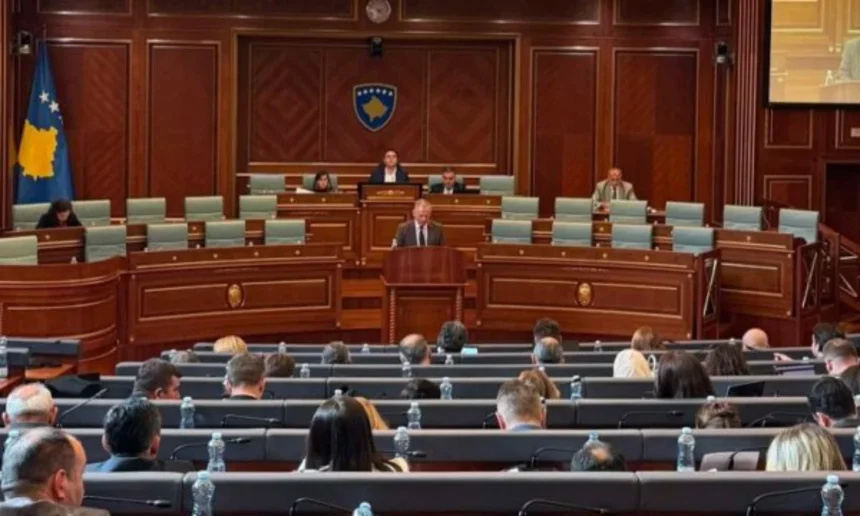Deputy Prime Minister Besnik Bislimi presented the National Program for European Integration 2024-2028 to the members of the Assembly of Kosovo today, which was approved by the Assembly.
Bislimi stated that the program consists of three blocks: political criteria, economic criteria, and alignment of legislation with the EU acquis.
“The program comprises 306 measures: 105 legislative measures and 201 implementing measures. Of the 105 legislative measures, 38 are draft laws, 3 are international agreements, and the rest are sub-legal acts,” he said.
He added that the short-term measures are fully harmonized with: the conclusions of the institutional structures of the Stabilization and Association Agreement (SAA); the Economic Reform Program 2024 – 2026; the National Development Plan; and the Government’s Legislative Program for 2024.
Bislimi then outlined some key reforms for each block, namely for political criteria, economic criteria, and European standards.
The full speech of Deputy Prime Minister Besnik Bislimi:
Following approval by the Government of the Republic of Kosovo on April 2, and three months after its approval by the Committee for European Integration, allow me to present the National Program for European Integration 2024 – 2028 for your approval.
The program consists of three blocks: political criteria, economic criteria, and alignment of legislation with the acquis.
The program consists of 306 measures: 105 legislative measures and 201 implementing measures. Of the 105 legislative measures, 38 are draft laws, 3 are international agreements, and the rest are sub-legal acts.
The budget for the implementation of this program is estimated to be 56,043,856 euros: of which 22,608,860 euros come from the public budget while 33,434,996 euros are from development partners and donors, thus ensuring zero budget vacuum for the implementation of this program.
The short-term measures planned are interlinked and fully harmonized with the conclusions of the institutional structures of the SAA; the Economic Reform Program 2024 – 2026; the National Development Plan; and the Government’s Legislative Program for 2024.
Since they are important for the work of the Assembly, the National Program for European Integration has planned these draft laws, including international agreements, and I will only speak about this year:
Draft Law for amending and supplementing laws that contain special administrative procedures and harmonizing them with the Law on General Administrative Procedure, in the third phase;
Draft Law for amending and supplementing the Law on the Organization and Functioning of State Administration and Independent Agencies;
Draft Law for inspecting product compliance;
Draft Law for public procurement (amendment);
Draft Law for public-private partnerships (amendment);
Draft Law for accounting, financial reporting, and auditing (amendment);
Draft Law for commercial companies;
Draft Law for state aid (amendment);
Draft Law for banks;
Draft Law for electronic communications;
Draft Law for agritourism;
Draft Law for agricultural land;
Draft Law for veterinary medicine;
Draft Law for fisheries and aquaculture;
Draft Law for vehicles;
Draft Law for driving licenses;
Draft Law for railways;
Draft Law for road transport;
Draft Law for the transport of hazardous goods;
Draft Law for railway safety;
Draft Law for energy;
Draft Law for electricity;
Draft Law for the Energy Regulator;
Draft Law for energy efficiency;
Draft Law for the right to a fair trial;
Draft Law for the Administrative Court;
Draft Law for amending and supplementing the law on the disciplinary responsibilities of judges and prosecutors;
Draft Law for amending and supplementing the law on foreigners;
Draft Law for amending and supplementing the law on arms;
Draft Law for amending and supplementing the law on the protection of critical infrastructure;
Agreement on legal cooperation with France;
Agreement on legal cooperation with Sweden;
Agreement on legal cooperation with Italy;
Draft Law for research and scientific activity, innovation, and knowledge and technology transfer;
Draft Law for environmental protection;
Draft Law for the management of water resources;
Draft Law for nature protection;
Draft Law for inspection in the fields of environment, waters, nature, spatial planning, construction, and housing;
Draft Law for medical devices and products;
Draft Law for tobacco control;
Draft Law for the General Auditor and the National Audit Office of Kosovo (amendment).
In summary, here are some key reforms for each block:
For political criteria:
- Legislation and framework policies for Public Administration Reform;
- Reduction of administrative burden;
- Rationalization of agencies;
- Advancement of policies and legislation for local governance;
- Advancement of reforms in foreign policy with the EU (in chapter 31).
For economic criteria:
- Implementation of the Strategy and Public Financial Management Reform Program 2022-2026;
- Fighting informal economy.
For European standards, or alignment of legislation:
- Legislative reforms in public procurement and public-private partnerships;
- Legislative reforms in inspections;
- Legislative reforms in the banking sector;
- Reforms in free movement of capital and financial services and their practical implementation;
- Legislative and policy reforms in the field of competition and state aid, and their practical implementation;
- Legislative and policy reforms in agriculture, agritourism, and veterinary fields;
- Legislative and policy reforms in transport and trans-European networks, ICT, and their implementation and institutional capacity building;
- Legislative and policy reforms in the energy sector and their implementation, in line with the decarbonization agenda;
- Legislative and policy reforms in the field of environment, water, and waste;
- Legislative and policy reforms in public health and consumer protection;
- Legislative and policy reforms in corporate law, enterprises, and industry focusing on improving service delivery for investors and other businesses, as well as strengthening competitiveness domestically and abroad;
- Legislative and policy reforms in the fields of justice, freedom, and security, focusing on institutional functioning, the justice system, legal professions, fundamental rights, media, gender equality, minority rights, and personal data protection;
- Legislative and policy reforms in the interior with a focus on border control, asylum and migration, public order, and police cooperation, cybersecurity, and international legal cooperation in criminal and legal matters;
- Legislative and policy reforms in the interior focused on combating money laundering, financing of terrorism, and drug trafficking;
- Improvement of policies and their implementation in education, science, and research;
- Advancement of policies and their implementation in financial control.
Dear members of the Assembly of the Republic of Kosovo, I invite you to approve this Program for European Integration in today’s session.







